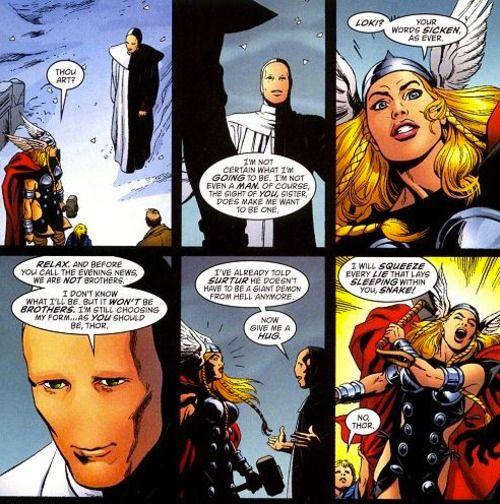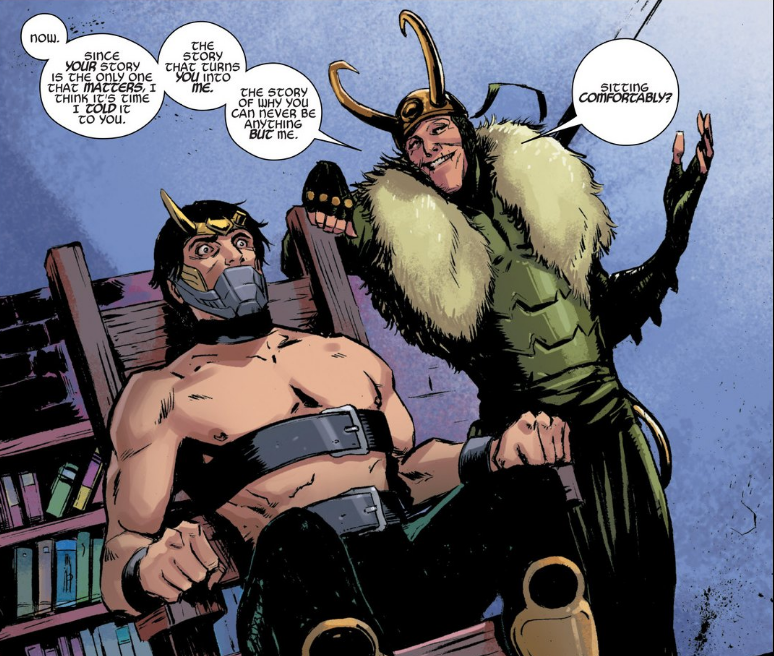Serialized stories can lead to a lot of stagnation. There's only so much growth permitted for long-running characters before they escape their original purpose and risk losing those fans who fell in love with them the way they were.
After 53 years, I'd argue Spider-Man has actually regressed some, to keep his original operation. Editorial believes having Peter Parker as a married man ages him too much and limits him as a traditional superhero, so we remove some bits and try on new ones, because he has to go somewhere. Growth is longevity, after all, and changing with the times ensures a character reaches that 53rd anniversary. Aged too far, a character becomes someone else entirely and risks losing readers who miss the "old" interpretation.
Change is such a tricky thing that, when done well, should be celebrated. With that in mind, hooray for Loki!
Sixty-six years ago, we saw Loki for the first time as a member of the Olympian gods in Venus #6, which shows just how crazy-far we're talking about coming. Even when he was placed in the right pantheon, he was still predictably villainous. Why? Because he's Loki; no other reason was necessary. Being the god of lies, he was incredibly useful to the Marvel Universe as a foil for its heroes. Thor, a big brute of a man, going up against his brother Loki in a battle of the minds is actually a pretty interesting fight, as they prod each other's weaknesses. Loki wanted to defeat his brother; he wanted power and other villainy things for no other reason than he desired them. Why was asked later.
WARNING: There will be spoilers for this week's Loki: Agent of Asgard #17.
You might think I'm going to talk more about the modern incarnation of Loki and how self-aware he's become, but believe it or not, the Loki we know and love today started a lot earlier. The seeds were planted long ago, in Earth X.
In 1999, Jim Krueger helped Alex Ross tell a story that would rival Kingdom Come in style, and fully exceed it in scope. There, Loki starts as our dastardly trickster, but soon learns a very important truth: On Earth-9997, due to Celestial manipulation, humans evolve into mutants with the next step in "evolution" being an ascent to godhood, where their powers are dictated by what others believe. When Loki reveals that to Odin and the other Asgardians, no one believes him. Why? Because he's the god of lies (and Odin could discredit him, thereby keeping his own machinations under wraps, but that's another story). And so Loki's first internal battle about his nature and his role in Ragnarok starts there.
That idea wasn't followed up on for a long time because, back in the 616 universe, Loki was a disembodied head on Thor's belt for Ragnarok. He returned as his more catalytic self through the events of Siege, where he was pulled into the Sentry's evilest alter-self, the Void. Sure, he had gained freedom from Asgard and the cycle, but at a cost he was suddenly unwilling to accept. However, he experienced that change of heart just before he was swallowed into oblivion.
Reborn again, this is the modern Loki we know. That's partly due to the strength of his character and the great creative teams that have taken to him, but also because of the popularity of movie-Loki, played by Tom Hiddleston. While Young Loki showed up in 2010, the Marvel Cinematic Universe Loki debuted in 2011, with his fan following cemented in 2012 with Marvel's The Avengers.
Loki begins to desire more than to fulfill his destiny to be "the bad guy" and to fail in the face of Ragnarok over and over again. Loki starts tricking fate itself, and he's self-aware enough to know his story. An older "future" self arrives to try and subvert young Loki's plans, displaying, in a very literal sense, his internal conflict of free will versus domination over destiny as his older self waged a war of secrets against his new, self-aware self.
That all came to a head this week in Loki: Agent of Asgard #17, at the very end of everything. Here is where the self-awareness transforms into a sort of self-acceptance of Loki and all he represents.
Facing down what might have been gods of gods or Jonathan Hickman's Beyonders, or some other cosmic force, Loki spins a yarn about the place of stories and the magic of names and words. He redefines his story to himself, "the trickster who takes no sides and no favorites, the teller of tall tales," and frightens them away by questioning their own creation and whether their hierarchy might simply be another story told to explain where Asgard came from. Much like in Earth X, Loki tells the truth to reality itself, but this time he has no one to question him. He faces down his old self, the dastardly conniver who started his adventures, and reveals him to be just another shade of himself, and accepts who he used to be. He is both the greater villain and the clever hero, the maker of mischief and whatever that requires him to be.
Loki has changed a lot since 1949, and almost all for the better. He's now more than the part he played in the greater notions of good and evil, more than a foil for Marvel's heroes. Yet, the character is still here to tell stories, and the more weight and understanding there is to Loki's motivations, the better those stories are going to be.
In Norse myth, it's humanity that has free will, and the gods who are forever linked to the great cycle of Ranarok. Loki is going to cycle again at the end of Secret Wars and become whatever the next creative team needs him to be. Whether that's the evil schemer or adventurous trickster, only Loki will know.




